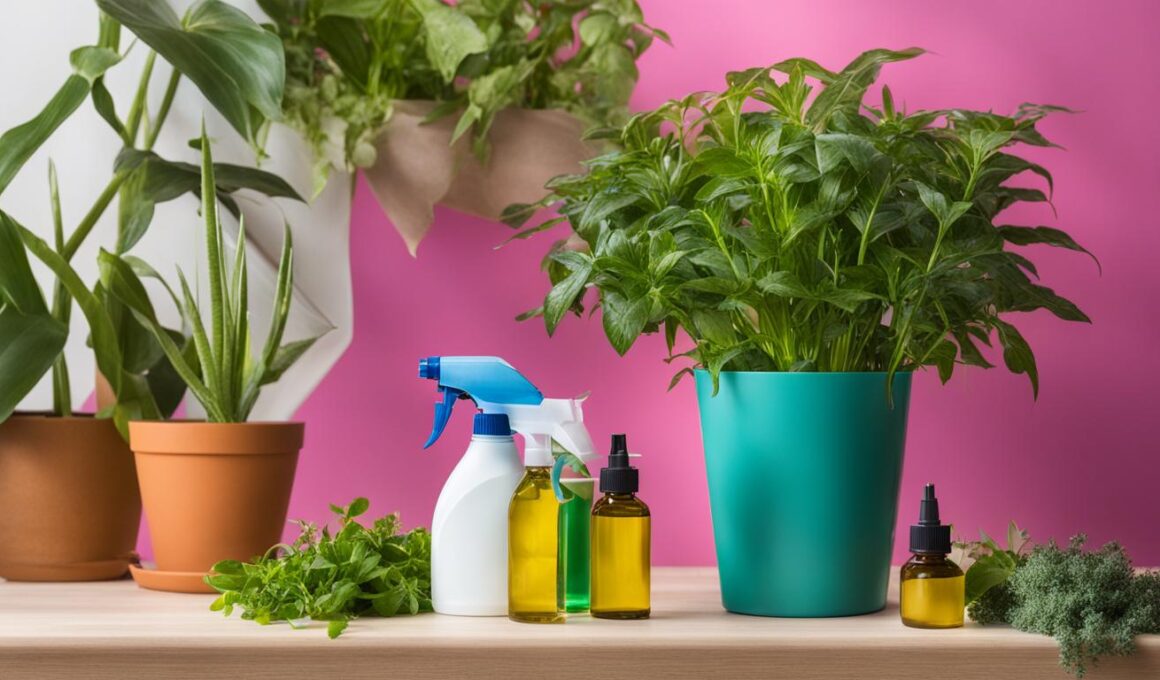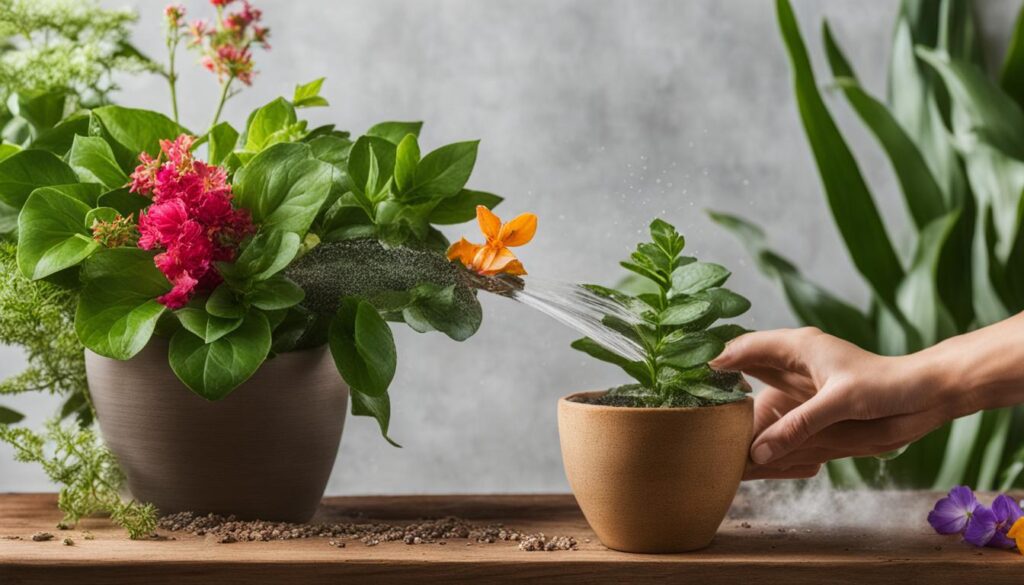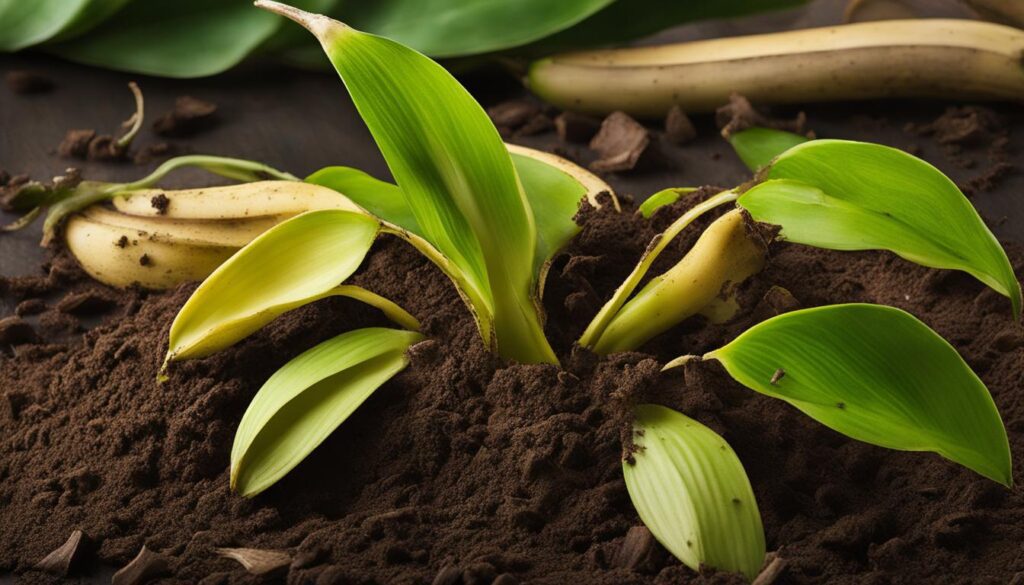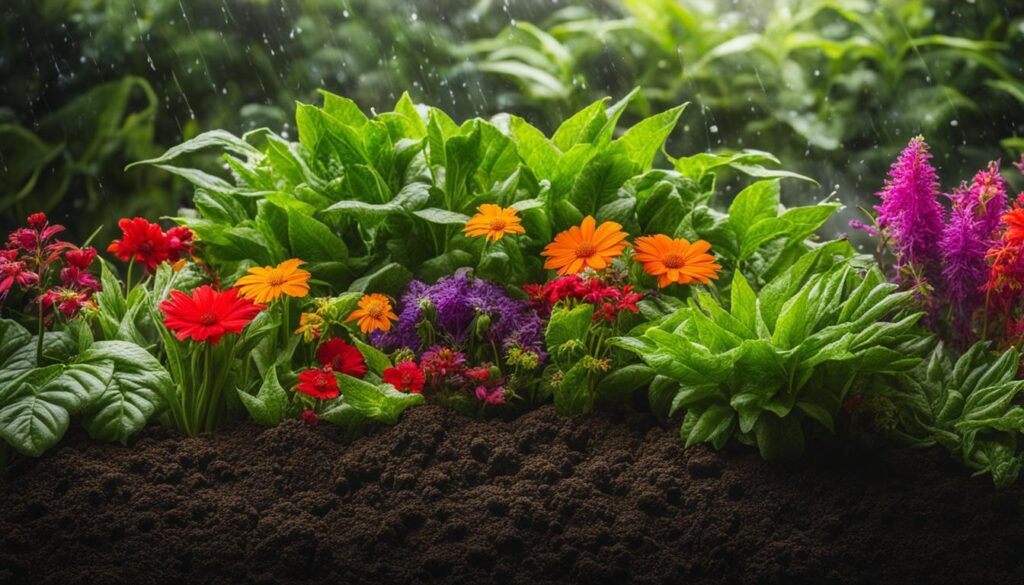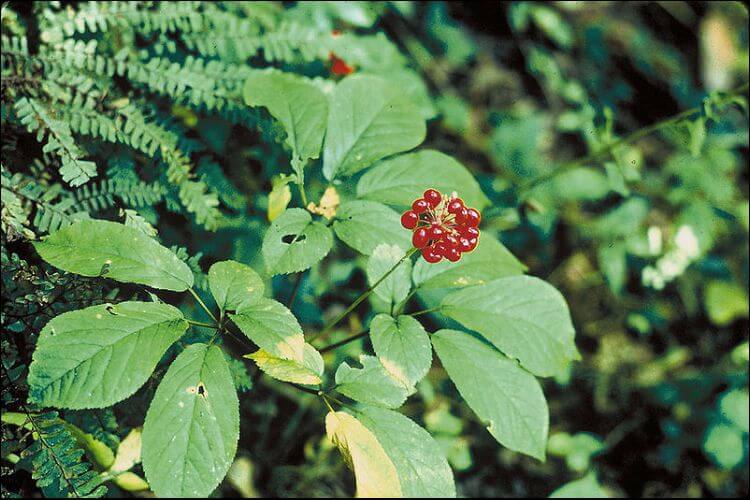Commercial fertilizers can be harsh on plants and the environment, but there’s a natural alternative you can try – DIY plant sprays for growth. By using homemade plant sprays, you can boost the growth of your greens while also nourishing them with nutrient-rich ingredients. So, put away those chemical fertilizers and discover the wonders of these DIY solutions.
Wood ash, bananas, compost tea, club soda, aquarium water, coffee grounds, eggshells, tea leaves, grass clippings, aged cow manure, shredded leaves, weed tea, blackstrap molasses, boiled vegetable water, and homemade plant food – these are just a few examples of the ingredients that can help stimulate plant growth. Experiment with different recipes and find the ones that work best for your garden.
Are you ready to unleash the full potential of your plants? Let’s dive into the details of these DIY plant sprays and discover how they can boost the growth of your greens.
Key Takeaways:
- DIY plant sprays provide a natural and environmentally friendly alternative to commercial fertilizers.
- Wood ash can neutralize acidic soil and promote plant growth.
- Bananas, specifically the peels, contain potash and phosphorus that enrich the soil and strengthen plants.
- Compost tea is rich in beneficial microorganisms that improve the vibrancy of plants.
- Club soda, with its macronutrients, can provide essential elements for plant growth.
Wood Ash – Neutralize Soil and Boost Growth
Wood ash is a natural and cost-effective way to improve the health of your plants. Not only does it help neutralize acidic soil, but it also provides essential nutrients that promote growth. The high alkaline content of wood ash makes it an excellent option for those dealing with soil pH imbalances.
To determine if your soil is acidic, alkaline, or neutral, use a soil test kit. If it’s too acidic, adding wood ash can help balance the pH level. Simply sprinkle a thin layer of cool wood ash over the affected area and gently mix it into the soil. It’s important to ensure the ash has completely cooled down before applying it to your garden to avoid any potential hazards.
Wood ash contains valuable nutrients such as potassium, calcium, and magnesium, which are essential for plant growth. These nutrients not only strengthen the root system but also improve overall plant health. By incorporating wood ash into your gardening routine, you can ensure that your plants receive the necessary nutrients they need to thrive.
Benefits of Using Wood Ash:
- Neutralizes acidic soil by increasing pH levels
- Improves nutrient availability to plants
- Enhances root development and overall plant health
- Cost-effective and readily available
Remember to use wood ash sparingly, as excessive application can lead to overly alkaline soil. Monitor your plants closely and adjust the amount of wood ash used based on their specific needs. With the right balance, you can enjoy healthier, more vibrant plants in your garden.
Bananas – Enrich Soil and Strengthen Plants
When it comes to giving your plants a natural boost, don’t overlook the humble banana. Banana peels are a fantastic source of nutrients that can enrich the soil and strengthen your plants, particularly tomatoes, rose bushes, and green pepper plants.
Why are banana peels so beneficial? They contain potash and phosphorus, two essential elements for plant growth. Potash helps regulate water movement in the plant, improves root development, and enhances flowering and fruiting. Phosphorus is crucial for overall plant health, promoting strong root growth, and increasing the plant’s ability to absorb other nutrients.
To harness the power of banana peels, simply chop them up into small pieces and bury them in the soil around your plants. As the peels decompose, they release nutrients into the soil, providing a slow-release fertilizer for your plants. This method is particularly effective when done at the time of planting, ensuring that your plants receive a steady supply of nutrients as they grow.
So, the next time you enjoy a banana, don’t discard the peel – put it to good use in your garden. By utilizing the natural goodness of banana peels, you can give your plants the nourishment they need to thrive.
Compost Tea – Improve Vibrancy of Your Plants
To take your plant growth to the next level, consider incorporating compost tea into your gardening routine. Compost tea is a liquid solution made by brewing compost, and it is packed with beneficial microorganisms that can enhance the health and vibrancy of your plants. This organic fertilizer is a great alternative to synthetic chemicals and can provide your plants with the essential nutrients they need to thrive.
Creating compost tea is a straightforward process. Start by filling a bucket or container with water. Then, add a generous amount of compost to the water and let it steep for a few days. During this time, the water absorbs the nutrients and microorganisms from the compost, creating a nutrient-rich solution.
Once the compost tea has brewed, strain out any solids using a fine mesh or cheesecloth. Then, dilute the tea by mixing it with water in a ratio of 1 part tea to 10 parts water. This dilution ensures that the tea is gentle enough to be absorbed by the plants without causing any harm. Finally, use a watering can or sprayer to apply the compost tea to the soil around the base of your plants.
Benefits of Compost Tea:
- Improves soil structure and fertility
- Enhances nutrient uptake in plants
- Stimulates beneficial microbial activity in the soil
- Helps suppress plant diseases
- Increases overall plant growth and vitality
By regularly applying compost tea to your plants, you can provide them with a steady supply of organic nutrients and encourage the growth of beneficial microorganisms in the soil. This natural approach to plant care not only benefits your plants but also promotes a healthier and more sustainable gardening practice.
Experiment with brewing compost tea using different combinations of compost ingredients, such as vegetable scraps, coffee grounds, and shredded leaves, to tailor the nutrient content to the specific needs of your plants. Remember to consistently monitor the health and growth of your plants to determine the optimal frequency and strength of compost tea application. With the regular use of compost tea, you’ll be amazed at how your plants flourish and thrive.
Club Soda – Nutrient-Rich Water for Plants
When it comes to nourishing your plants, you might be surprised to learn that club soda can be a secret weapon in your gardening arsenal. This carbonated water is more than just a refreshing drink; it contains valuable macronutrients that can boost the growth and vitality of your plants.
By using club soda instead of tap water, you provide your plants with essential elements such as carbon, oxygen, hydrogen, phosphorus, potassium, sulfur, and sodium. These macronutrients play a crucial role in plant development, helping to strengthen their roots, promote healthy foliage, and enhance overall growth.
Why choose club soda for your plants?
- Carbon: Essential for photosynthesis, carbon helps your plants convert sunlight into energy.
- Oxygen: Crucial for root health, oxygen enables proper respiration and nutrient absorption.
- Hydrogen: A component of water molecules, hydrogen is vital for hydrating your plants and maintaining their overall moisture balance.
- Phosphorus: Key for root development, phosphorus stimulates the growth of strong and resilient root systems.
- Potassium: Important for overall plant health, potassium helps regulate water uptake, boosts disease resistance, and enhances fruit production.
- Sulfur: Essential for the production of proteins and enzymes, sulfur contributes to healthy growth and vibrant foliage.
- Sodium: While not typically considered a necessary nutrient, sodium can benefit certain plants by aiding in nutrient uptake and improving cell membrane permeability.
Using club soda in your garden
Applying club soda to your plants is simple. Fill a watering can with club soda and use it to water your plants as you normally would. Make sure to soak the soil thoroughly to ensure the nutrients penetrate the root zone. Regular use of club soda can help boost the overall health and vigor of your plants, leading to more robust growth and vibrant blooms.
So, the next time you reach for a drink, consider the benefits of using club soda for your plants. It’s a natural and nutrient-rich solution that can nourish your garden and help your plants thrive.
Aquarium Water – Beneficial Waste and Bacteria for Plants
Did you know that the water from your fish tank can be a valuable resource for your plants? Aquarium water, with its beneficial waste and bacteria, can provide a natural boost to your plant’s growth and overall health.
When you clean your fish tank or perform regular water changes, don’t just throw away the old water. Instead, repurpose it to nourish your plants. The waste and bacteria in aquarium water contain essential nutrients that can benefit your plants.
However, it’s important to note that you should only use freshwater from your fish tank, not saltwater. Saltwater can be detrimental to most plant species. Additionally, while aquarium water can benefit ornamental plants, it’s best to avoid using it on edible plants as a precautionary measure.
Benefits of Using Aquarium Water for Plants
- Provides essential nutrients: The waste from your fish, along with beneficial bacteria, contains nutrients like nitrogen, phosphorus, and potassium that can promote healthy growth in your plants.
- Improves soil fertility: The nutrients in aquarium water can enrich the soil, making it more fertile and conducive to plant growth.
- Enhances microbial activity: The bacteria present in the water can stimulate the growth of beneficial microorganisms in the soil, creating a thriving ecosystem for your plants.
“Using aquarium water for my plants has been a game-changer. I’ve noticed a significant improvement in the overall health and vibrancy of my garden. Plus, it’s a sustainable way to repurpose water that would otherwise go to waste.”
– Amanda, avid gardener
So, the next time you clean your fish tank, remember to save the aquarium water and put it to good use in your garden. Your plants will thank you for the nutrient-rich treat!
Conclusion
By using these DIY plant sprays for growth, you can nurture your plants with natural, nutrient-rich ingredients. From wood ash and banana peels to coffee grounds and eggshells, there are plenty of homemade solutions to enhance the health and vitality of your plants without the use of harsh commercial fertilizers. Experiment with different recipes and find the ones that work best for your garden. Happy gardening!
Can DIY Plant Spray for Growth also work as an Effective Home Plant Pesticide?
Yes, a DIY plant spray for growth can also serve as an effective home plant pesticide. By using natural ingredients like neem oil and garlic, these sprays can promote plant growth while also deterring harmful insects and pests. Embracing organic solutions can be both cost-effective and environmentally friendly when it comes to home plant pesticide.
FAQ
Are DIY plant sprays effective for boosting plant growth?
Yes, DIY plant sprays can be effective in promoting plant growth. Using natural ingredients such as wood ash, banana peels, compost tea, and club soda can provide plants with essential nutrients and beneficial microorganisms.
Why should I use wood ash in my garden?
Wood ash has a high alkaline content, making it great for neutralizing acidic soil. By testing your soil and applying wood ash accordingly, you can improve soil pH and promote healthier plant growth.
How can banana peels benefit my plants?
Banana peels are rich in potash and phosphorus, which can enrich the soil and strengthen plants. Chop up banana peels and bury them in the soil when planting tomatoes, rose bushes, or green pepper plants for maximum benefits.
What is compost tea and how does it improve plant vibrancy?
Compost tea is a liquid solution created by brewing compost. It contains beneficial microorganisms that can improve soil health, enhance nutrient availability, and promote organic growth. Applying compost tea to your plants can result in increased vibrancy and overall plant health.
Can club soda be used as a plant spray?
Yes, club soda can be used as a nutrient-rich water alternative for plants. It contains macronutrients such as carbon, oxygen, hydrogen, phosphorus, potassium, sulfur, and sodium, which can benefit plant growth. Instead of using tap water, use club soda to provide additional nutrients to your plants.
How does aquarium water benefit plants?
Aquarium water contains beneficial waste and bacteria that can nourish plants. When using aquarium water, make sure to use freshwater only and apply it to ornamental plants rather than edible ones to avoid any potential contamination.
Are DIY plant sprays a sustainable alternative to commercial fertilizers?
Yes, DIY plant sprays made from natural ingredients provide a sustainable alternative to commercial fertilizers. By utilizing materials such as wood ash, banana peels, coffee grounds, eggshells, and compost, you can nourish your plants without negatively impacting the environment.
How often should I use DIY plant sprays?
The frequency of using DIY plant sprays can vary depending on the specific ingredient and plant type. It is recommended to follow specific instructions for each method and observe how your plants respond. Start with a small amount and increase gradually if needed.
Can I combine different DIY plant sprays together?
Yes, you can experiment with different DIY plant sprays and combine them to create a custom blend. However, it is important to ensure compatibility between ingredients and consider the specific needs of your plants before creating combinations.





